Italian lawmakers say Italy used spyware to target phones of immigration activists, but not against journalist

An Italian parliamentary committee confirmed that the Italian government used spyware made by the Israeli company Paragon to hack several activists working to save immigrants at sea. The committee, however, said its investigation concluded that a prominent Italian journalist was not among the victims, leaving key questions about the spyware attacks unanswered.
The Parliamentary Committee for the Security of the Republic, known as COPASIR, published a report on Thursday that concluded a months-long inquiry into the use of Paragon’s spyware, known as Graphite, across Italy. Israeli newspaper Haaretz first wrote about the report.
In January, WhatsApp began sending notifications to around 90 of its users, alerting them that they may have been targeted with Paragon’s spyware. Several people in Italy came forward after receiving the notifications, prompting a scandal in Italy, which has a long history of hosting spyware companies, and its government’s own spyware uses and abuses.
Since then, COPASIR has investigated the allegations with the goal of clarifying exactly what happened.
COPASIR specifically investigated the targeting of Luca Casarini and Giuseppe Caccia, who both work for Mediterranea Saving Humans, an Italian nonprofit with the mission of rescuing immigrants who try to cross the Mediterranean Sea. In both their cases, the committee concluded that they were lawfully targeted by Italian intelligence agencies as part of investigations related to the alleged facilitation of illegal immigration into the country.
But the COPASIR committee concluded there was no evidence that Francesco Cancellato, a journalist who also received a notification from WhatsApp warning him he had been a target of Paragon’s spyware, had been targeted by Italy’s intelligence agencies.
The committee wrote that its representatives were able to query the intelligence agencies’ spyware database and audit logs for Cancellato’s phone number, and did not find any relevant records. The committee said it also did not find evidence of any legal requests to spy on Cancellato from from the country’s top prosecutor’s office, nor from the Department of Information for Security, or DIS, a top Italian government department that oversees the activities of the country’s two intelligence agencies, the AISE and AISI.
The report noted that Paragon has foreign government customers that could potentially target Italians, leaving the door open that this may be how the targeting of Cancellato’s phone can be explained. COPASIR did not provide any evidence to support this theory.
Contact Us
Do you have more information about Paragon, and this spyware campaign? From a non-work device, you can contact Lorenzo Franceschi-Bicchierai securely on Signal at +1 917 257 1382, or via Telegram and Keybase @lorenzofb, or email. You also can contact TechCrunch via SecureDrop.
Cancellato is the director of Fanpage.it, an Italian news website that is known for several investigations including one on the youth-wing of the far-right ruling party in Italy, led by Prime Minister Giorgia Meloni. That investigation revealed that, in private, the members made racist remarks and chanted fascist songs and slogans.
The report made no mention of Ciro Pellegrino, a colleague of Cancellato, who received a notification from Apple at the end of April saying he had been targeted with government spyware. It’s unclear if Pellegrino was targeted with Paragon’s spyware, and the Apple notification did not say.
The Italian government, as well as COPASIR, did not respond to a request for comment, specifically asking about Cancellato and Pellegrino.
Cancellato responded to the report in an article published on Friday, in which he questioned COPASIR’s conclusions on his case, and asked for more and better explanations.
“Case closed? Not at all,” Cancellato wrote.
For John Scott-Railton, a senior researcher at The Citizen Lab, a human rights organization that investigates spyware abuses — including the recent cases of abuse in Italy, determining who was targeting Cancellato is the top question left unanswered by the report.
“This report creates a problem for Paragon Solutions because the report leaves the most politically sensitive case unanswered: Who targeted this journalist? This outcome can’t make Paragon happy,” Scott-Railton told TechCrunch. “Because Francesco Cancellato’s case remains completely unexplained, all eyes are back on Paragon for an answer.”
Scott-Railton also said that Citizen Lab is still investigating Cancellato’s case and analyzing his phone and data. Cancellato also confirmed this to TechCrunch.
Paragon did not respond to a request for comment.
COPASIR also investigated the cases of Mattia Ferrari, the chaplain on the rescue ship of Mediterranea Saving Humans; and David Yambio, the president and co-founder of the non-government organization Refugees in Libya, which is active in Italy. COPASIR said it did not find evidence that Ferrari was targeted, but confirmed there was evidence Yambio had been a lawful target of surveillance, although not with Paragon’s spyware.
New details uncovered by the investigation
As part of its investigation into the Italian government’s alleged use of spyware, COPASIR set out to find out as much information about the use of Paragon in the country, requesting information from other government bodies, as well as from Citizen Lab, and WhatsApp’s owner Meta.
According to the report, the national anti-mafia prosecutor told COPASIR that no prosecutor’s office in Italy had acquired nor used Paragon’s spyware. (In Italy, every local prosecutor’s office has some level of freedom in procuring spyware.) The Carabinieri military police, the national Polizia di Stato, and the financial crimes agency Guardia di Finanza gave the committee the same answer.
Paragon told COPASIR that it had contracts with Italy’s two intelligence agencies, AISE and AISI. The report said that COPASIR representatives visited the DIS, as well as the two agencies’ offices, and examined the spyware’s database and audit logs to see how the agencies used Paragon’s spyware, including who they targeted. The representatives concluded that there were no abuses related to the surveillance of the people who came forward as spyware targets in the last few months.
COPASIR’s report also revealed new details on how Paragon’s spyware system works behind the scenes. COPASIR said it verified that to use Paragon’s spyware, an operator has to log in with a username and password, and each deployment of the spyware leaves detailed logs, which are located on a server controlled by the customer and not accessible by Paragon. But, according to COPASIR, the customer cannot delete data from the audit logs on their servers.
The committee also uncovered details about the relationship between Paragon and its Italian intelligence customers, AISE and AISI, which said they have since rescinded their contracts with Paragon.
Italy’s foreign intelligence agency AISE, which started using Graphite on January 23, 2024 after signing a contract a month earlier, has been using Paragon’s spyware with the goal of investigating “illegal immigration, searching for fugitives, smuggling of fuels, counterintelligence, countering terrorism and organized crime, as well as for the internal security activities of the agency itself.”
In doing so, the report said AISE targeted an “extremely limited” but unspecified number of phone users and accessed both real-time and stored communications sent over end-to-end encrypted apps.
COPASIR said that AISI, Italy’s domestic intelligence agency, started using Graphite earlier in 2023 and its now-cancelled contract would have expired on November 7, 2025. Like AISE, AISI used Graphite in a small but undisclosed number of cases related to acquiring real-time communications, while the cases are “a little more numerous” when it comes to exfiltrating chat messages stored on a target’s devices.
For every spyware deployment, the agencies said it had the appropriate legal approval, according to the report.
COPASIR said it had a chance to review Paragon’s contracts with its Italian customers and verify that there are clauses that forbid the use of the spyware against journalists and human rights activists.
In March, following an investigation, Citizen Lab published a report on Paragon that named the governments of Australia, Canada, Cyprus, Denmark, Israel, and Singapore as likely customers of the spyware maker.
Last year, American private equity giant AE Industrial reportedly purchased Paragon for a deal that could reach $900 million.
Keep reading the article on Tech Crunch
The Trump-Musk feud has been great for X, which jumped up the App Store charts

The feud between Elon Musk and President Donald Trump may be bad for the MAGA camp, but it’s proven to be beneficial for X, which has seen engagement soaring over the past 24 hours. According to new data from Sensor Tower, the app formerly known as Twitter skyrocketed up the U.S. App Store’s top charts, landing at the 23rd overall spot on June 5 — up from an average rank of No. 68 over the last 30 days.
X also saw an average rank of No. 58 over the past six months.
The ranking changes could be influenced by increased downloads and engagements with the X application.
Meanwhile, X’s ranking on Google Play in the U.S. climbed as well, up around 20 spots from the prior seven-day average and up 16 spots from the average over the past 30 days.
Sensor Tower estimates that total U.S. mobile app active users on X on June 5 increased by 6%, likely as a result of the Trump-Musk breakup, which captured the internet’s interest.
Specifically, the firm found that U.S. mobile app active users on X between 2 p.m. and 6 p.m. Eastern time on June 5 were up by 54% compared to the last seven days.
Trump’s own social network, Truth Social, benefited from the feud as well, as the president shared his thoughts about Musk with his followers. Compared with the last seven days, U.S. mobile app active users on Truth Social increased by more than 400%, Sensor Tower’s proprietary panel indicates.
However, X is still much larger than Truth Social, Sensor Tower notes, as it has 100x more U.S. mobile app users than Trump’s social network.
Across both apps, the number of U.S. mobile app active users between 2 p.m. and 6 p.m. Eastern reached a 90-day high.
X is continuing to grow its rank in the wake of the Trump-Musk breakup. As of the time of writing, the app is the 19th top free iPhone app on the U.S. App Store. Truth Social is No. 14 in the Social Networking category, but is ranked below No. 150 overall on the free iPhone apps chart on the U.S. App Store.
Keep reading the article on Tech Crunch
Figure AI CEO skips live demo, sidesteps BMW deal questions onstage at tech conference

Brett Adcock, co-founder and CEO of the humanoid robotics startup Figure AI, made a rare public appearance at the Bloomberg Tech conference on Thursday. Figure has recently been the subject of a couple news articles that questioned its progress with marquee customer BMW. Figure objected so strenuously to at least one of these reports that Adcock publicly threatened to sue the publication.
When asked about the skepticism surrounding the BMW relationship and whether it is a pilot or has commercial value to the company, Adcock replied with an explanation of the technical benefit of having robots on a factory floor but didn’t provide specifics about the contractual relationship with BMW.
“We get a lot of value, and it’s really important that we need to figure out how to run robots every day. We get to see how well they perform. We get to track all the metrics,” he said. Two months ago, Figure also published a YouTube video showing a couple of its robots working in a BMW factory.
Adcock did, however, say that Figure AI has signed a contract with a second, unnamed customer for initial deployment, a customer that Bloomberg has reported to be UPS.
Figure AI has drawn attention for making claims that its AI-powered robots possess human-like fine motor skills and can manipulate objects with precision. Despite releasing numerous videos of its robots at work, the company hasn’t done a live demonstration of the humanoids.
The interviewer, Bloomberg’s Ed Ludlow, pointed out that while two other robotics companies, Agility Robotics and Boston Dynamics, showcased their robots at the conference, Figure AI did not. “It kind of goes back to our whole philosophy around we don’t go to a lot of events,” said Adcock. “I think it’s a giant waste of time. To be frank, I have to bring a team here to bring robots here. They could be at the office,” he said, adding that the company is showcasing the robots in videos.
Adcock confirmed that Figure AI is expecting to manufacture and deploy roughly 100,000 units within four years.
The skepticism about Figure’s commercial relationship comes amid the company’s attempts to raise a $1.5 billion round at a $39.5 billion valuation, sources told Bloomberg, a fifteenfold increase from the $2.6 billion valuation it achieved in February 2024.
TechCrunch reported in April that Figure AI has been issuing cease-and-desist letters to secondary market brokers, demanding they stop marketing its shares because they are not authorized to do so.
Keep reading the article on Tech Crunch
Jony Ive’s LoveFrom helped design Rivian’s first electric bike

LoveFrom, the creative firm founded by former Apple chief designer Jony Ive, played a role in the development of Rivian’s first electric bike, according to multiple sources who spoke to TechCrunch.
For about 18 months, a handful of LoveFrom staff worked alongside Rivian’s design team and engineers within a skunkworks program led by Specialized’s former chief product and technology officer Chris Yu. LoveFrom’s work on the micromobility project ended in fall 2024, according to the sources.
LoveFrom and Rivian declined to comment.
Rivian’s skunkworks program, which eventually grew to a team of about 70 people hailing from Apple, Google, Specialized, Tesla, and REI Co-Op, spun out earlier this year with a new name and $105 million in funding from Eclipse Ventures.
The micromobility startup, called Also, has yet to show off its first vehicle designs. In interviews with TechCrunch, Rivian founder and CEO RJ Scaringe (who is on Also’s board) and Yu were cagey about what the new company’s first vehicle would look like.
“There’s a seat, and there’s two wheels, there’s a screen, and there’s a few computers and a battery,” Scaringe said in March. He has also said it will be “bike-like,” a description confirmed by sources.
But both Scaringe and Yu spoke of a much bigger vision for Also, one where it could theoretically tackle almost any imaginable micromobility form factor. The new company is supposed to reveal its first designs at an event later this year. An Also spokesperson declined to comment about its bike or any connection to LoveFrom.
When the electric “bike” is revealed, it’s possible that Ive’s fingerprints will be all over it.
Ive is best known for being the design force behind the iPhone and myriad other Apple products, and most recently, for his work with Sam Altman and OpenAI. But his collaboration with Rivian is not his first foray into the transportation industry.
The parent company of Ferrari announced in 2021 that Ive’s firm would help develop the Italian supercar manufacturer’s next-generation vehicles. Ive was also involved with Apple’s secretive car project. He was reportedly one of the main proponents for centering Apple’s long-running car project around autonomy, whereas other people inside the company pushed for a more traditional electric car. Apple abandoned that project early last year.
Sources told TechCrunch that Ive’s LoveFrom has acted as a consultant for Rivian in the past, including on the company’s redesigned infotainment system and retail, among other areas, according to two former employees with knowledge of the relationship. But its involvement in what would become Also was a more structured and dedicated effort, another source familiar with the relationship said.
The skunkworks program began taking shape in early 2022 with a directive to explore whether Rivian’s EV technology could be condensed down into something smaller and more affordable than its electric vans, trucks, and SUVs.
Initially, the small team worked with Rivian designers to develop a product that could scale to different types of vehicles. A key design challenge was how to make the bike-like product modular while still maintaining the elevated aesthetics Rivian has become known for.
By the time LoveFrom got involved in the project in early 2023, a lot of work had been completed, according to sources who said they helped refine the prototypes.
The relationship was described as a “pretty tight” collaboration between the skunkworks team, LoveFrom’s staff, and the industrial designers based out of Rivian’s headquarters in Irvine. This group looked at everything, including the user interface and UX for the bike.
The industrial design team at LoveFrom, which has a lot of experience with thoughtful and clever packaging, was particularly involved, according to one source, who noted the team brought an interdisciplinary and international perspective to the project.
Keep reading the article on Tech Crunch
Building Your AI Engine: How OpenAI Works with Startups
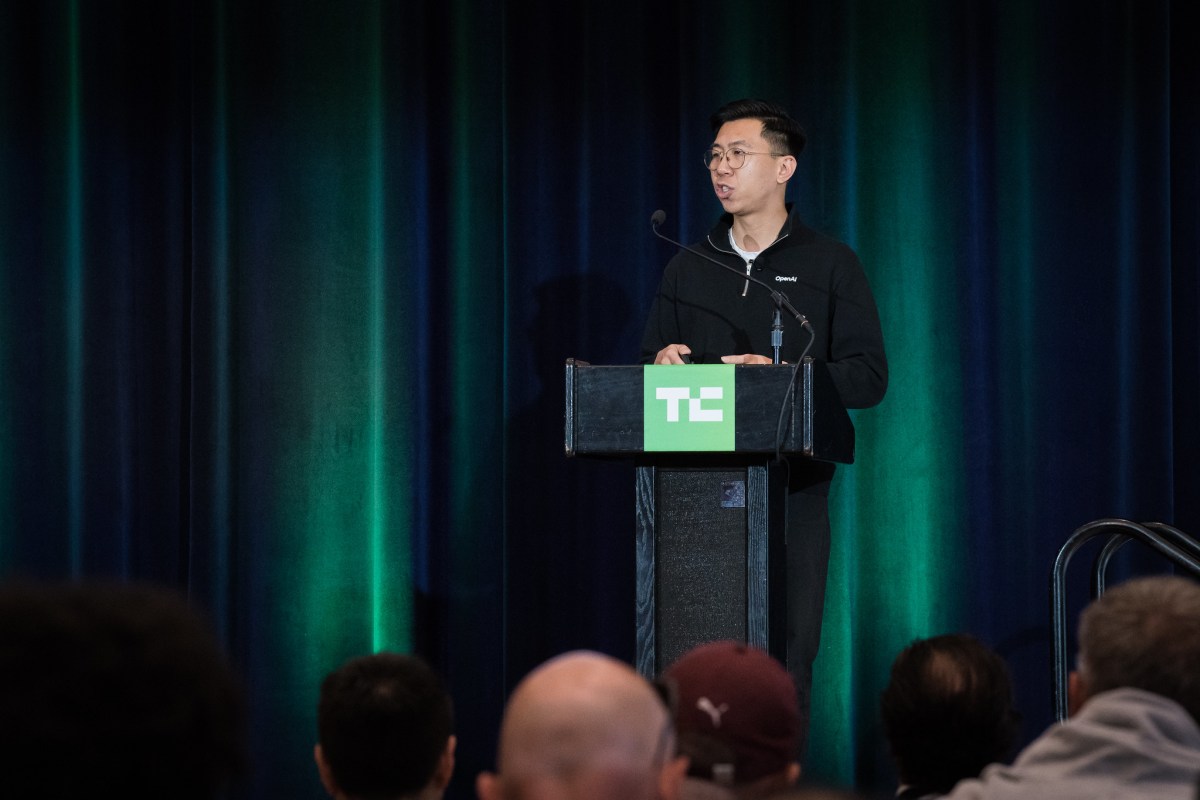
In the rapidly evolving AI landscape, startups can gain a competitive edge by collaborating closely with model providers. Join Hao Sang from OpenAI’s Startups Team demystifies OpenAI’s resources for startups, from technical guidance to advanced model access, in a discussion from TechCrunch Sessions: AI. Discover how feedback from startups helps shape OpenAI’s roadmap, ensuring that their products evolve to meet your needs.
And you can check out the rest of our Sessions: AI programming right here.
Keep reading the article on Tech Crunch
AI startups take to the stage to pitch their companies to a panel of judges

During the “So You Think You Can Pitch?” event at TechCrunch Sessions: AI, three AI companies — Fluix AI, Clicka, and Narada AI — had four minutes apiece to impress judges from Initiate Ventures, Felicis, and Recursive Ventures.
Each company made the case for their products, platforms, solutions, and leadership capabilities to see their vision through to the end.
Fluix AI
Narada AI
Clicka
Keep reading the article on Tech Crunch
Building More Scalable GenAI Applications for Startups and Developers
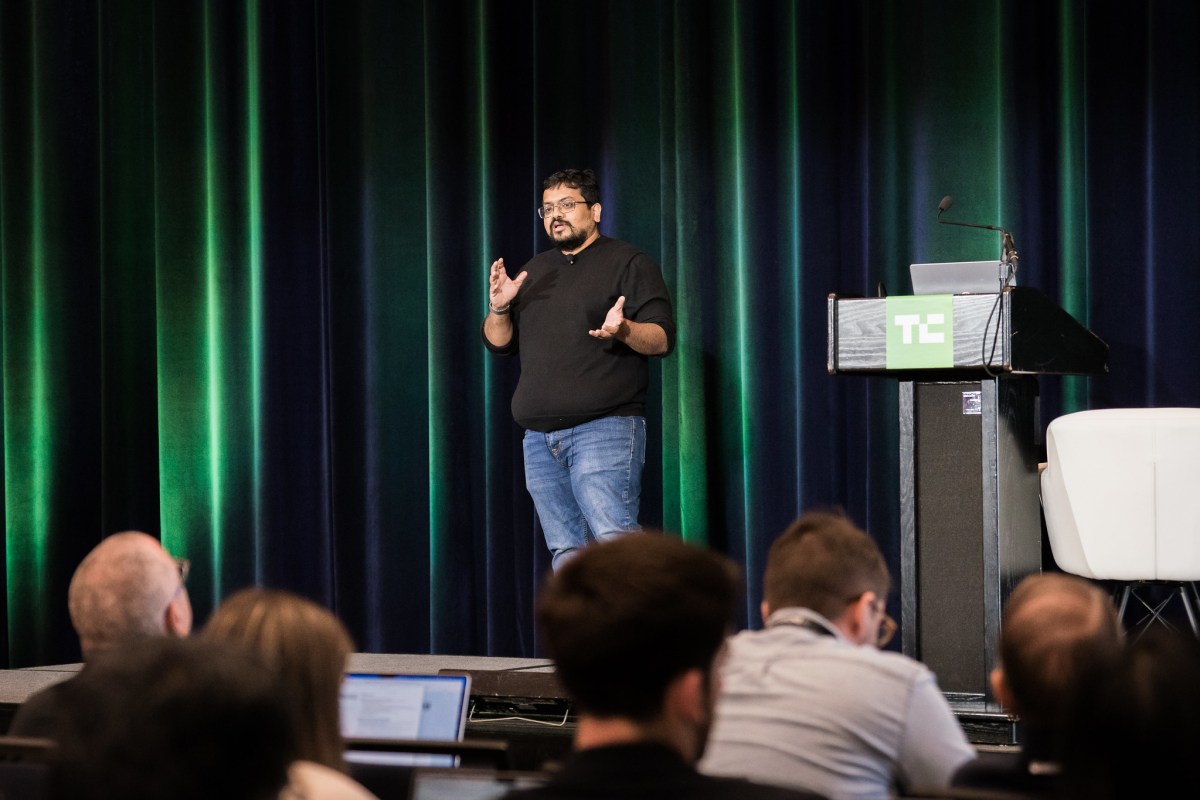
In this TechCrunch Sessions: AI event, Oracle shares a rundown of how MySQL HeatWave empowers you in building AI-based solutions in areas such as personal productivity, automating workflows for compliance, service, or support, and increasing efficiencies in healthcare, among others.
By leveraging HeatWave’s built-in vector store, in-database LLMs, in-database machine learning capabilities, and massively parallel processing architecture, teams can develop richer GenAI applications that incorporate real-time data, advanced personalization, and complex retrieval-augmented generation techniques without the need for separate, specialized databases or complex ETL processes.
This approach simplifies the GenAI development stack, accelerates time-to-market, and allows startups and developers to focus on innovation rather than infrastructure management, ultimately enabling the creation of more powerful, responsive, and scalable GenAI solutions.
And for the rest of our Sessions: AI programming, check out our playlist here.
Keep reading the article on Tech Crunch
Genetics testing startup Nucleus Genomics criticized for its embryo product: ‘Makes me so nauseous’
Nucleus Genomics, a genetic testing startup founded by 25-year-old Kian Sadeghi, initially launched in 2021 with the goal of calculating a patient’s risk for specific diseases.
But it’s been courting controversy for years with products that claim to tell people how their genetics correlate to a host of complex issues, including their IQ.
On Wednesday, it ratcheted up the controversy to an earsplitting level when it announced a new product called Nucleus Embryo with a tweet that said: “Every parent wants to give their children more than they had. For the first time in human history, Nucleus adds a new tool to that commitment.”
Nucleus says it can test IVF embryos not just for well-known specific genes that have a high chance of illnesses like breast cancer, but also for appearance — sex, height, hair color, eye color — as well as IQ and complex health attributes like anxiety and ADHD.
The launch video includes a screenshot of a comparison menu. The idea is to help parents choose which embryos to pick and which ones to, perhaps, discard.
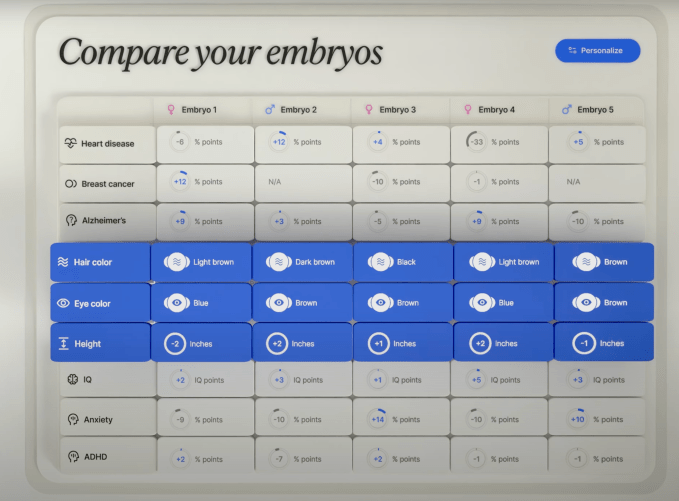
Genetic testing of embryos isn’t unheard of. IVF physicians can test for genes that can cause conditions like Down syndrome, or when parents know they are of high risk for a particular genetic disorder, like cystic fibrosis.
But that’s not exactly what Nucleus is doing. It is using controversial “polygenic scores” to determine “complex genetic outcomes, like intelligence and anxiety,” a spokesperson says.
According to the National Human Genome Research Institute, polygenic scores only calculate the probabilities of a certain complex illness occurring, mainly within populations. “A polygenic risk score can only explain the relative risk for a disease,” the NHGR says. This is not the same as discovering a specific gene, such as the BRCA1 gene mutation, which gives a person a 60% to 80% “absolute risk of breast cancer,” the NHGR says.
There’s a reason doctors don’t typically use such tests for individuals. “Polygenic risk scores are not yet routinely used by health professionals because there are no guidelines for practice and researchers are still improving how these scores are generated,” according to the NHGR.
Nucleus defends that its method can be used to determine an individual’s risk. The spokesperson pointed us to a 2018 paper where the authors said they had developed validated methods for five common diseases: coronary artery disease, atrial fibrillation, type 2 diabetes, inflammatory bowel disease, and breast cancer.
That paper was advocating screenings to help individuals make lifestyle or therapeutic decisions, similar to Nucleus’s initial concept.
Wednesday’s tweet was promising parents that Nucleus can help them create designer babies. It has now been viewed more than 4 million times and has hundreds of comments, many of them either expressing disbelief that this works as promised, or horror at the idea.
One VC chimed into the discussion saying, “I was going to type something like Noah get the boat but honestly the reality of this just makes me so nauseous.”
Nucleus has experienced this kind of controversy before, as TechCrunch previously reported, when it announced its $14 million Series A earlier this year. The startup is backed by Founders Fund; Alexis Ohanian’s 776; and angels, including Adrian Aoun (CEO at Forward Health), Brent Saunders (former CEO at Allergan), and Matteo Franceschetti (CEO at Eight Sleep).
Last year, Sadeghi launched Nucleus IQ, which is supposed to tell users how much their genetics influence intelligence. The product was blasted as “bad science and big business” by some critics. Sadeghi published a lengthy defense of his company’s methodology.
Even so, telling adults that they are genetically smart is one thing. Telling IVF parents that they can choose the appearance and other complex attributes for their children is, many would argue, something else.
Nucleus is not currently conducting such tests via IVF lab partners itself, The Wall Street Journal reports. It’s partnering with Genomic Prediction, which works with IVF clinics. A Genomic executive told the WSJ that many parents request intelligence tests, and it doesn’t provide that. Parents can voluntarily upload genetic data information to Nucleus if they want to pursue it.
Or, as Sadeghi said in the launch video aimed at would-be parents: “Not that long ago, IVF-1 sparked fear and the stigma of test tube babies,” he said. “What was once controversial is now an everyday practice. The same is true with genetic optimization. The technology is now here and it’s here to stay.”
Keep reading the article on Tech Crunch
EleutherAI releases massive AI training dataset of licensed and open domain text

EleutherAI, an AI research organization, has released what it claims is one of the largest collections of licensed and open-domain text for training AI models.
The dataset, called The Common Pile v0.1, took around two years to complete in collaboration with AI startups Poolside, Hugging Face, and others, along with several academic institutions. Weighing in at 8 terabytes in size, The Common Pile v0.1 was used to train two new AI models from EleutherAI, Comma v0.1-1T and Comma v0.1-2T, that EleutherAI claims perform on par with models developed using unlicensed, copyrighted data.
AI companies, including OpenAI, are embroiled in lawsuits over their AI training practices, which rely on scraping the web — including copyrighted material like books and research journals — to build model training datasets. While some AI companies have licensing arrangements in place with certain content providers, most maintain that the U.S. legal doctrine of fair use shields them from liability in cases where they trained on copyrighted work without permission.
EleutherAI argues that these lawsuits have “drastically decreased” transparency from AI companies, which the organization says has harmed the broader AI research field by making it more difficult to understand how models work and what their flaws might be.
“[Copyright] lawsuits have not meaningfully changed data sourcing practices in [model] training, but they have drastically decreased the transparency companies engage in,” Stella Biderman, EleutherAI’s executive director, wrote in a blog post on Hugging Face early Friday. “Researchers at some companies we have spoken to have also specifically cited lawsuits as the reason why they’ve been unable to release the research they’re doing in highly data-centric areas.”
The Common Pile v0.1, which can be downloaded from Hugging Face’s AI dev platform and GitHub, was created in consultation with legal experts, and it draws on sources, including 300,000 public domain books digitized by the Library of Congress and the Internet Archive. EleutherAI also used Whisper, OpenAI’s open source speech-to-text model, to transcribe audio content.
EleutherAI claims Comma v0.1-1T and Comma v0.1-2T are evidence that the Common Pile v0.1 was curated carefully enough to enable developers to build models competitive with proprietary alternatives. According to EleutherAI, the models, both of which are 7 billion parameters in size and were trained on only a fraction of the Common Pile v0.1, rival models like Meta’s first Llama AI model on benchmarks for coding, image understanding, and math.
Parameters, sometimes referred to as weights, are the internal components of an AI model that guide its behavior and answers.
“In general, we think that the common idea that unlicensed text drives performance is unjustified,” Biderman wrote in her post. “As the amount of accessible openly licensed and public domain data grows, we can expect the quality of models trained on openly licensed content to improve.”
The Common Pile v0.1 appears to be in part an effort to right EleutherAI’s historical wrongs. Years ago, the company released The Pile, an open collection of training text that includes copyrighted material. AI companies have come under fire — and legal pressure — for using The Pile to train models.
EleutherAI is committing to releasing open datasets more frequently going forward in collaboration with its research and infrastructure partners.
Keep reading the article on Tech Crunch
Disruption playbook: How to beat AI incumbents at their own game
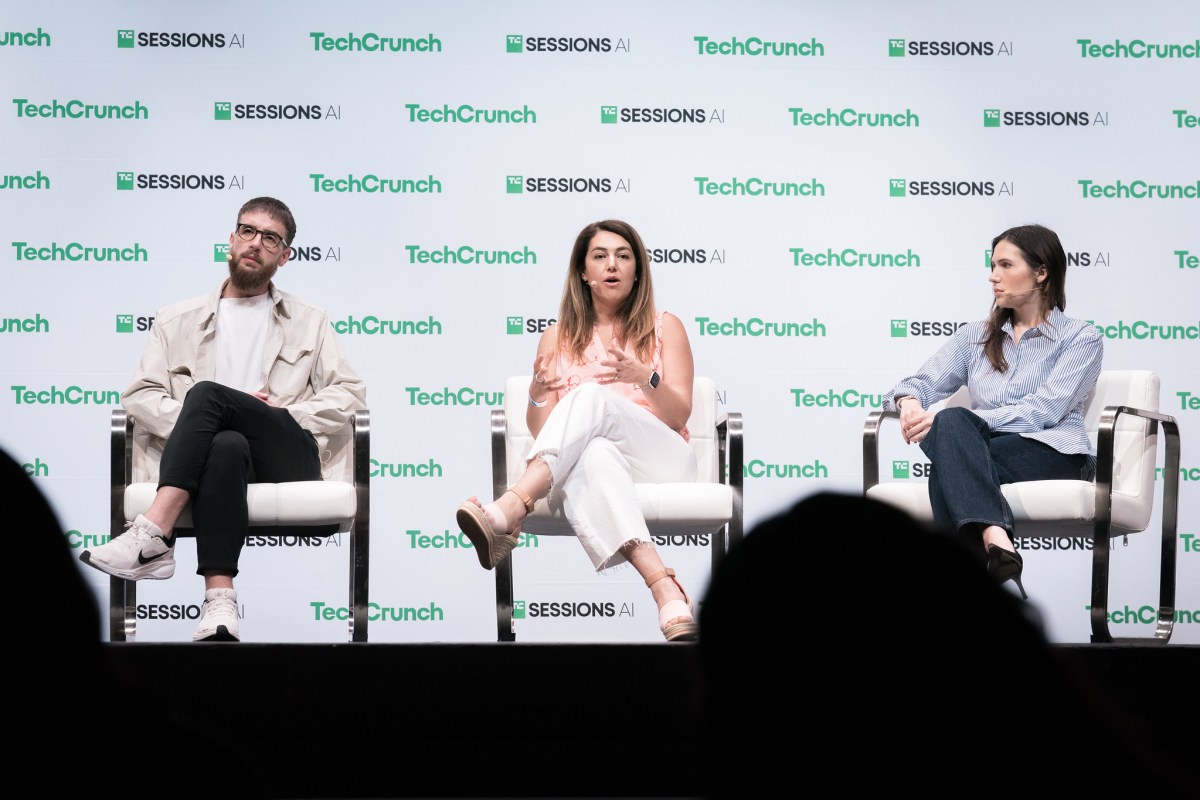
The harsh reality of the AI sector is that it’s dominated by a select group of well-funded incumbents. That doesn’t mean new companies can’t break through, but it makes it all that much harder for them to do so.
At TechCrunch Sessions: AI, Odyssey co-founder Oliver Cameron, Linear COO Cristina Cordova, and NEA partner Ann Bordetsky explored their proven strategies for finding success as they fended off formidable rivals, in a conversation moderated by AI editor Kyle Wiggers at TC Sessions: AI.
Keep reading the article on Tech Crunch
X names Polymarket as its official prediction market partner
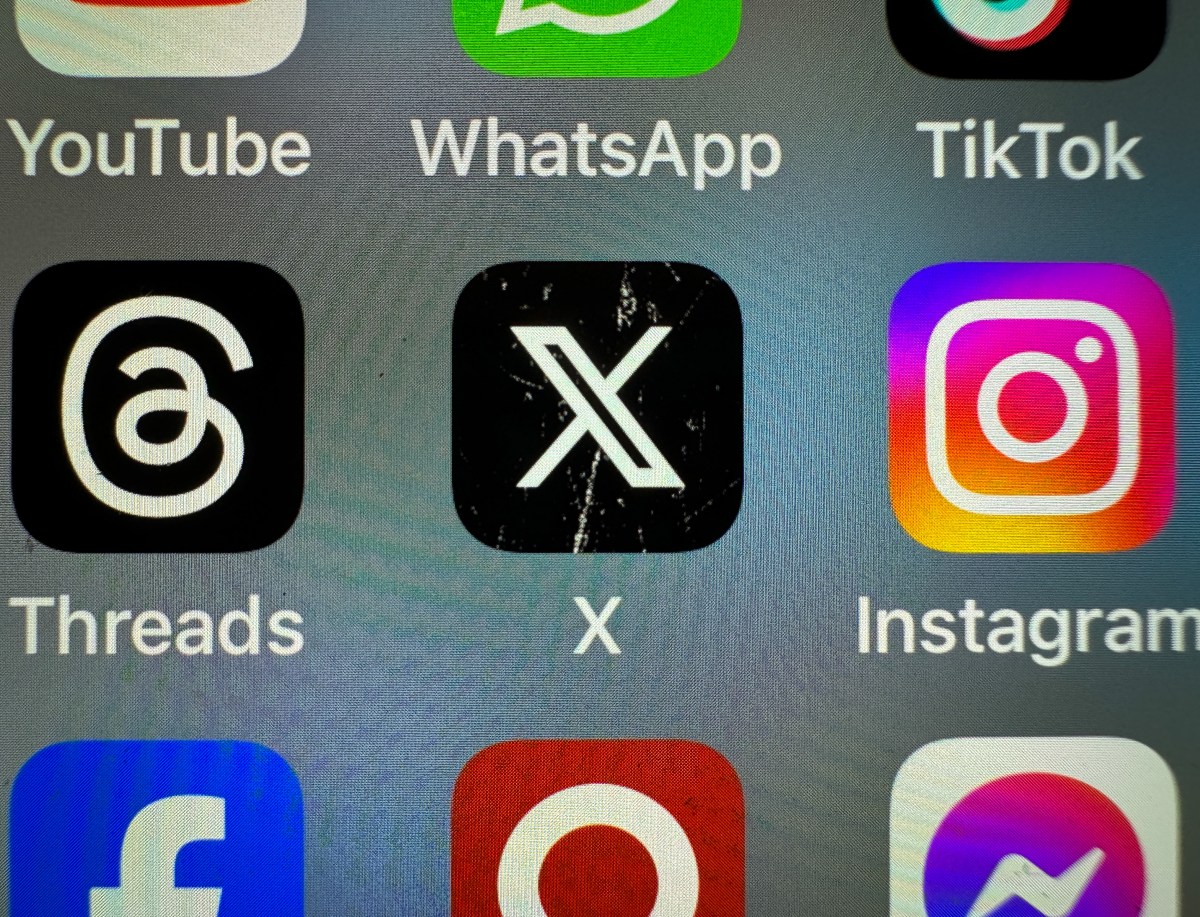
X, formerly Twitter, announced on Friday that it has partnered with Polymarket, naming it the platform’s official prediction market partner. Launched in 2020, Polymarket allows users to bet on the outcomes of real-world events using cryptocurrency.
Although the companies didn’t announce specifics about the partnership, they shared that they will be launching “an integrated product to deliver data-driven insights and recommendations.” Polymarket predictions will be combined with X data to deliver live insights, with real-time annotations of market moves from Grok and relevant X posts, Polymarket explained in a press release.
The product will be the first in “a suite of integrations and unique experiences” that will emerge from the partnership, the company said.
“Combining Polymarket’s accurate, unbiased, and real-time prediction market probabilities with Grok’s analysis and X’s real time insights will enable us to provide contextualized, data-driven insights to millions of Polymarket users around the world instantaneously,” said Shayne Coplan, founder and CEO of Polymarket, in the press release. “We look forward to enhancing X and Polymarket users’ ability to make instant sense of breaking news and make informed decisions about the future as we continue to scale our platform.”
In 2024, over $8 billion in predictions were made on Polymarket across politics, current events, pop culture, and more.
The news comes nearly a year after Polymarket partnered with AI-powered search engine Perplexity to display news summaries of events. This happened around the same time that Polymarket partnered with Substack to allow writers to embed prediction data from its platform into their posts.
Keep reading the article on Tech Crunch
Startups Weekly: It’s buying season
Welcome to Startups Weekly — your weekly recap of everything you can’t miss from the world of startups. Want it in your inbox every Friday? Sign up here.
From acquiring stealth startups to larger ones, and from funding Series A to Series G rounds, buyers and investors made for a busy news cycle.
Most interesting startup stories from the week
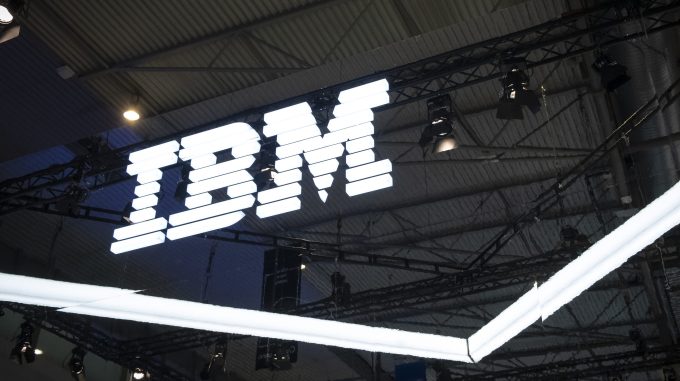
This week must have seemed like the perfect time for companies to announce their latest startup acquisitions.
Unlocked: Israeli phone unlocking firm Cellebrite acquired mobile testing startup Corellium for $170 million in cash, with $20 million converted to equity at closing.
Sought and found: IBM acquired Seek AI, an AI platform that lets users ask questions about enterprise data using natural language. Its technology is set to become a key part of Watsonx AI Labs, IBM’s new NYC-based AI accelerator.
Data access: Data governance platform Collibra acquired Raito, a startup that had raised $4 million to date to help companies manage which employees and customers have access to internal data. Both Collibra and Raito are based in Brussels.
Challenger: AMD acquired Brium, a stealth startup focusing on AI software optimization, in a deal that appears intended to challenge Nvidia’s AI hardware dominance.
Crunchy: Snowflake disclosed it plans to buy Crunchy Data, a startup that helps companies build with Postgres. The cloud data platform company declined to comment on the deal’s valuation, but a source estimated it at around $250 million.
No more pesto: Data-labeling startup Scale AI hired the team behind Pesto AI, which is shutting down after raising more than $8 million to help companies recruit developers remotely.
Hmm: Airtime, the video startup from Evernote’s founder Phil Libin, laid off dozens of employees, who won’t be invited to stay for the next “season.” The company, formerly known as mmhmm, raised nearly $135 million in venture funding across multiple early-stage rounds.
Ouch: Indian grocery startup KiranaPro confirmed that it was hacked last May. All of its data was wiped in the attack.
The legal battle continues: HR tech startup Deel accused rival Rippling of hiring an employee who spent six months impersonating a customer, but Rippling also issued an amended complaint regarding its corporate spying accusations against Deel.
Most interesting VC and funding news this week

Money once again flew uphill this week, but some funding also went to startups that hope to challenge market leaders, expand internationally, and make roads safer.
Lucky Luckey: Defense tech startup Anduril raised a gigantic $2.5 billion Series G round, including a $1 billion investment from Founders Fund, doubling the company’s valuation to $30.5 billion in the process.
Moving the cursor: Anysphere, the maker of AI coding assistant Cursor, has raised $900 million at a $9.9 billion valuation. Sources said the company has surpassed $500 million in annual recurring revenue.
Brain chips: Neuralink, Elon Musk’s brain computer interface startup, secured a $650 million Series E, reportedly at a pre-money valuation around $9 billion.
Insured: Bolttech, a Singapore-based insurtech company specializing in embedded insurance, completed a $147 million Series C at a $2.1 billion valuation.
APUs vs. GPUs: Speedata, an Israeli chip startup competing with Nvidia, raised a $44 million Series B. The company is developing an analytics processing unit (APU) to accelerate AI and data workloads, which it will showcase later this month.
From Ireland to Japan: Irish fintech startup Nomupay locked in a $40 million Series C from SB Payment Service (SBPS), a subsidiary of Japanese telco giant SoftBank Corp. It will use the capital on expanding its reach in key regions, including Asia, as well as on acquisitions.
Drive with care: Obvio, a startup using AI and cameras installed on stop signs to detect unsafe driving, raised a $22 million Series A led by Bain Capital Ventures.
Richest slice: Between February and May of this year, North American AI startups attracted $69.7 billion in venture capital across 1,528 deals, far exceeding Europe’s $6.4 billion (742 deals) and Asia’s $3 billion (515 deals), according to PitchBook data.
Last but not least

Elad Gil began investing in AI startups like Perplexity and Harvey well before most VCs recognized the trend. Now he’s placing bets on traditional businesses that AI can help reinvent and make more lucrative.
Keep reading the article on Tech Crunch
Clean energy investment hits new highs and shows no sign of slowing
The world is set to invest nearly twice as much in clean energy as fossil fuels this year, according to a new International Energy Agency report.
While fossil fuel outlays are still significant — about $1.15 trillion this year — they’ll be dwarfed by clean energy, which is expected to receive $2.15 trillion in 2025.
But the real takeaway is that the energy transition doesn’t show signs of slowing.
Plotting the two investment trends is revealing. Over the last decade, fossil fuel investment has been relatively steady, if declining slightly. There has been an uptick since a drop that coincided with the pandemic, but even that shows signs of softening this year.
But clean energy investment follows a different path, a far more aggressively positive trend: The curve is up and to the right.
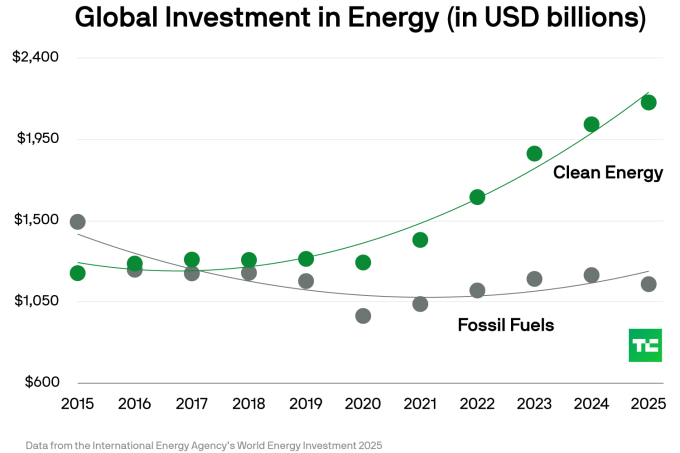
For data nerds: A second-order polynomial fit to the fossil fuel investment does a reasonable job of explaining the variance (R2 = 0.74), suggesting the world might be extracting a bit more oil, coal, and gas in the near future. But the same type of equation applied to clean energy figures fits the data far better (R2 = 0.94). Unless the world takes a U-turn — something that hasn’t happened in the 10 years the IEA has collected this data, pandemic included — expect bigger clean energy numbers next year.
The big question is whether it’ll be too little, too late.
To hit net zero by 2050, the world has to invest an average of $4.5 trillion annually, according to a report from the World Economic Foundation. That’s double this year’s investment, which sounds like a lot. But analysts have previously issued overly cautious clean energy investment forecasts. The trend in the new IEA data suggests that the goal is within reach.
Clean energy’s exponential growth won’t last forever; the trend is likely to taper off in the coming years, just like it did in the mid-2010s. But as I’ve written before, these sorts of fits and starts are not unusual, and adoption of new technologies is never continuous. Instead, it’s influenced by global economic trends and the learning curve that companies face when incorporating them into their businesses.
Ultimately, by 2050, I suspect average annual investment will probably meet or exceed the $4.5 trillion annual rate that the World Economic Forum calls for. Clean energy technologies are cheaper by the year, which makes them more accessible. Indeed, 85% of electricity demand growth in the next two years is going to come from developing and emerging economies, and while cheap coal has driven the narrative in many of those, solar and wind shouldn’t be counted out.
The wildcard, of course, is data centers. In the U.S., at least, utilities are confronting demand forecasts with enormous error bars. Those forecasts may fall short, but utilities tend to err on the side of caution, which means finding more power.
Some will turn to gas turbines, others will bet on nuclear. But in the next few years — and likely over the long term — renewables paired with energy storage will have the upper hand. They’re probable winners not just because they’re getting cheaper, but because they’re modular. They can be deployed at a range of scales and prices. It’s easy for them to be everywhere, and that’s something investors love to see.
Keep reading the article on Tech Crunch
Humans provide neccessary ‘checks and balance’ for AI, says Lattice CEO
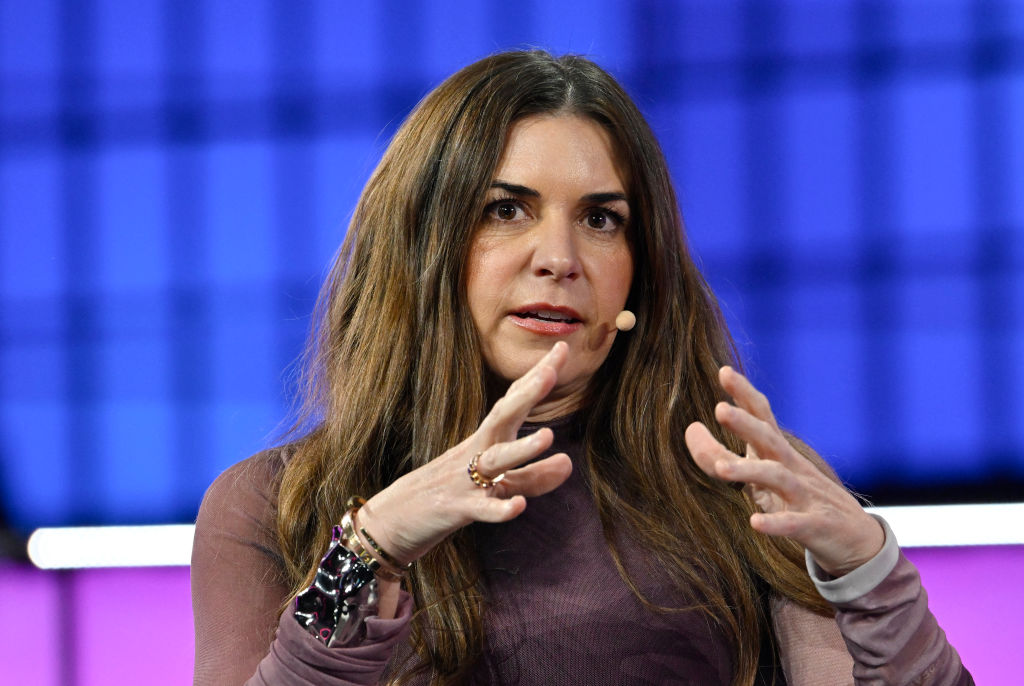
Of all the words in the dictionary, Sarah Franklin says “balance” is perhaps her favorite – especially when it comes to companies embracing AI.
Franklin leads the Jack Altman-founded employee performance software company Lattice, which is now worth $3 billion. Both on stage at SXSW London and in conversation with TechCrunch, she spoke a lot about balance — the opportunities in finding it, and the risks of not having it during this AI revolution.
“We put people first,” Franklin told TechCrunch, referring to Lattice, which has started to adopt more AI and automation features.
Although some companies are touting AI as a way to replace massive numbers of workers, some tech leaders are speaking more openly about the importance of striking a balance at their companies: retaining human employees while augmenting them with AI assistants and “agents.” At SXSW London, Franklin said that looking to fully replace human workers might seem like a good idea in the short term for cost-saving reasons, but such a move might not actually be attractive to customers.
“It’s important to ask yourself, ‘Are you building for the success of the AI first [or are] you building for the success of the people and your customers first?” she said, adding that trust is the most important currency any founder or startup company has, and that building trust with consumers is paramount. “It’s good to have efficiency, but you don’t want to trade out trust.”
Franklin also stressed the importance of transparency, accountability, and responsibility when it comes to AI. Leaders need to be transparent with employees about what the AI is doing, the AI must be narrowly applied to a particular goal so people understand how it works, and humans must ultimately be held accountable for what the AI impacts.
“Otherwise, we are then in service of the AI versus the AI being in service of us,” Franklin continued.
In an interview with TechCrunch after her SXSW appearance, Franklin said Lattice has built an AI HR agent that gives proactive insights and assists employees in one-on-one meetings. The company also has a platform where Lattice clients can create their own custom agents for their businesses.
Franklin was adamant that humans must have oversight of any AI technology implemented by a company. “It’s a way to just have the regular checks and balances that we’re used to in our workforce,” she told TechCrunch.
She thinks the victors in this AI moment in history will be the ones who learn how to put people first. According to Franklin, it’s one of the most important guardrails that a company can have on AI.
“We all have a responsibility to make sure that we’re doing this for the people of society,” Franklin said. “Human connection cannot be replaced, and the winners are going to be the companies that understand that.”
Keep reading the article on Tech Crunch
The best ways to build on top of foundation models, with DeepMind, Twelve Labs, and Amazon
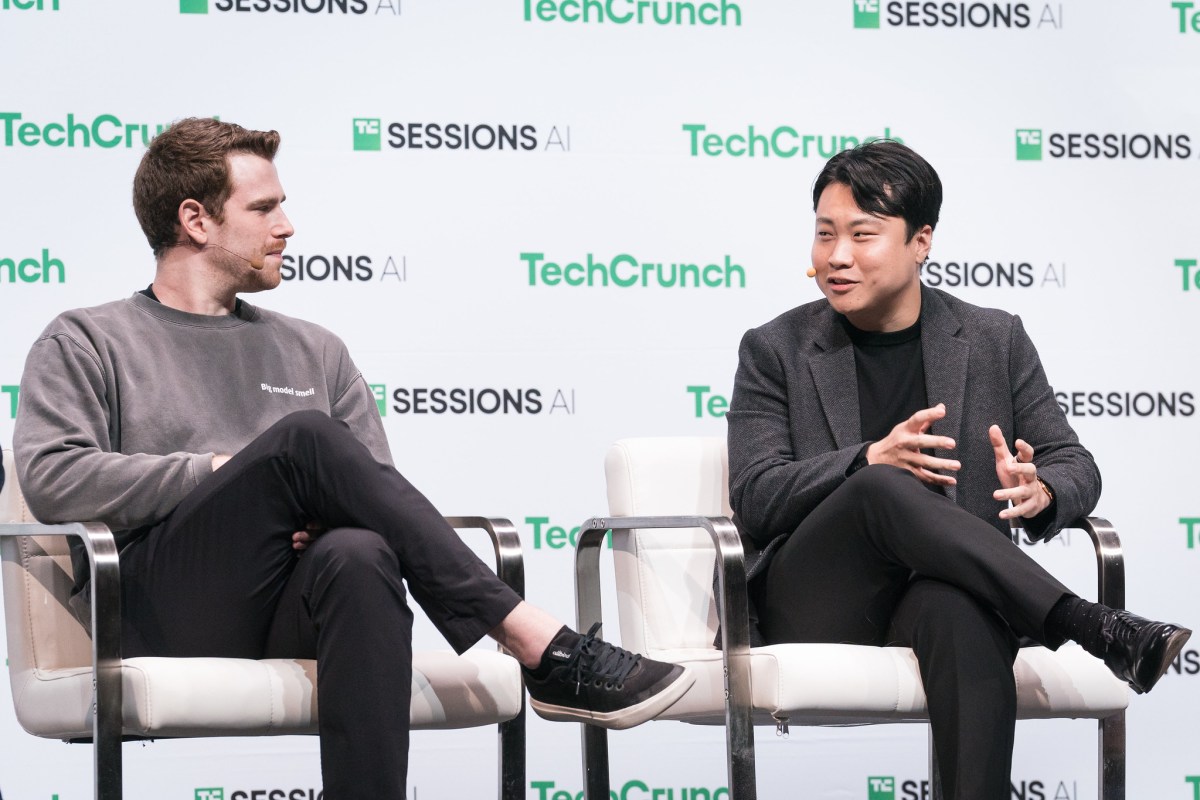
New AI models are dropping all the time, and existing models are getting better all the time. How can a startup build a sustainable business on top of all of changing infrastructure and evolving foundation models?
At TechCrunch Sessions: AI event, industry experts from DeepMind, Twelve Labs, and Amazon all shared their strategies for growing with foundation models instead of being left behind. In the minds of these experts, that challenge also presents an opportunity: Founders get the chance to build what they really want to build, with more tools and resources out the gate than ever before, thanks to existing AI infrastructure that’s only improving.
Keep reading the article on Tech Crunch
OpenAI’s marketing head takes leave to undergo breast cancer treatment

OpenAI’s head of marketing, Kate Rouch, has announced she’s stepping away from her role for three months while she undergoes treatment for invasive breast cancer.
In a post on LinkedIn, Rouch says that Gary Briggs, Meta’s former CMO, will serve as interim head of marketing during her leave.
“Earlier this year — just weeks into my dream job — I was diagnosed with invasive breast cancer,” wrote Rouch. “For the past five months, I’ve been undergoing chemo at UCSF while leading our marketing team. It’s been the hardest season of life — for me, my husband, and our two young kids.”
Rouch says her prognosis is “excellent” and that she’s expected to make a full recovery.
“1 in 8 American women will get invasive breast cancer,” she wrote in her post. “42,000 die every year. Rates are rising for young women. I’m sharing my story […] to get their attention and encourage them to prioritize their health over the demands of families and jobs. A routine exam saved my life. It could save yours too.”
Rouch, who previously worked with Briggs at Meta, joined OpenAI in December. She formerly was Coinbase’s CMO, and before that led brand and product marketing for platforms including Instagram, WhatsApp, Messenger and Facebook.
Keep reading the article on Tech Crunch
AMD acqui-hires the employees behind Untether AI

AMD is continuing its acquisition spree.
Semiconductor giant AMD acqui-hired the team behind Untether AI, a startup that develops AI inference chips, as originally reported by CRN. Untether claims that their chips are faster and more energy-efficient than their rivals. The terms of the deal weren’t disclosed.
Toronto-based Untether was founded in 2018 and has raised more than $150 million in venture capital from firms including Intel Capital, Radical Ventures, and Tracker Capital Management, among others.
Untether released an AI chip in October meant to power physical AI applications in machines, including cars and agricultural devices.
Earlier this week, AMD announced it had acquired AI software optimization platform Brium.
TechCrunch has reached out to AMD for more information.
Keep reading the article on Tech Crunch
GoPro HERO13 Black Bundle Now at All-Time Low, and All Accessories Would Cost a Fortune If Bought Separately
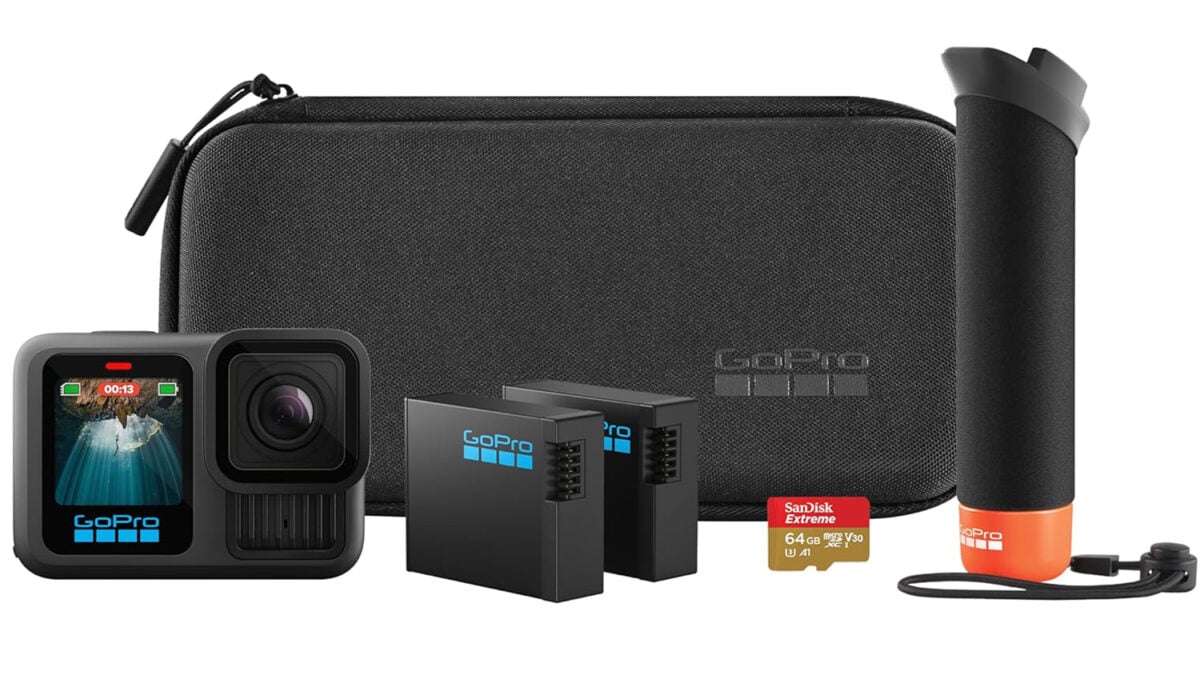
A GoPro camera on its own is great, but it won’t be long before you’re back online looking for all the extra accessories that you need to really make awesome videos. Here’s your way to kill a whole ton of birds with one stone — the GoPro HERO13 Black accessory bundle is 21% off right now at Amazon, which comes out to just $379, a $100 price break that will have you unleashing your inner Tarantino right out of the box.
The GoPro HERO13 Black can shoot jaw-dropping 5.3K video — 91% more resolution than 4K and 665% more than 1080p — and you can make screengrabs up to 24.7 megapixels from those movies with the GoPro Quik app. The camera alone is a great buy, but when you add in all of the must-have accessories, it becomes the perfect deal for content creators or anyone who just loves shooting and sharing great videos.
Best In Class
The resolution and quality of the videos captured by the HERO13 is virtually unmatched by any other camera of this size and versatility. You can use a vast array of lenses to create videos with different feels and looks, including the HB Series Lenses that the HERO13 can auto-detect and immediately switch to the settings that work best with the lens. You won’t need a special lens to capture incredible slo-mo action, which can be shot with Burst Slo-Mo at 400fps for 15 real-time seconds of 720p quality, or even 5.3K resolution at 120fps for 5 seconds.
As any pro-level action camera should, the GoPro HERO13 is built to withstand extreme conditions and all of the bumps and falls that inevitably happen. It has a water-repelling lens cover to reduce flare in underwater videos, and it’s waterproof up to 33 feet in depth. The body is designed to absorb shocks that come with falls or collisions or any other action mishaps you subject it to.
Video Goody Bag
Now that we’re done singing the very deserved praises of the GoPro HERO13 Black camera, let’s run down the rest of the bundle. Start with The Handler, a floating hand grip designed to keep your GoPro HERO13 camera from being lost forever when you’re shooting underwater videos; and two of the new 1900mAh rechargeable Enduro batteries made for the HERO13, each of which gives you up to 2.5 hours of continuous shooting.
Throw in two curved adhesive mounts that let you attach the HERO13 to a curved surface (like a helmet), a 64GB SanDisk MicroSD card, mounting buckle and thumb screw, USB-C cable, and a carrying case for the camera and all of its equipment. All in, the camera and accessories come out to a $500 value. but it’s just $379 at Amazon during this deal.
Creator Caucus launches in Congress with support from Patreon, YouTube

Representatives Yvette Clarke (D-NY) and Beth Van Duyne (R-TX) launched the bipartisan Congressional Creators Caucus on Thursday, which aims to support the creator economy.
Though it once seemed like a pipe dream to make a living on the internet, this industry has become a reality — Oxford Economics estimates that YouTube’s ecosystem alone powered over 390,000 full-time equivalent jobs in 2022, while Goldman Sachs estimates that the creator economy could be worth half a trillion dollars by 2027.
But the U.S. government doesn’t have much regulatory oversight or understanding of the creator economy as it stands, leaving creator businesses in a bind.
“As digital content creators’ online presence continues to reach billions globally, Congress must work to ensure resources and protections are in place to support their success in this new era of start-ups,” Representative Clarke said in a statement.
Matthew Patrick (MatPat) and Stephanie Patrick, who founded the popular digital production studio Theorist Media, spoke at a press event for the launch of the caucus. The husband and wife duo have spent over a year lobbying on Capitol Hill to advocate for creators’ needs.
“We’re trying to educate lawmakers about what the creator economy is, and that it’s an actual job and that we are actually small businesses, and as a result, there are certain tax codes and things that apply to small businesses,” Matthew Patrick (the creator known as MatPat) told TechCrunch last year. “Even when you talk to accountants, they’re like, well, are you though? Because there’s not a clear indicator on tax forms — like, what is a creator business?”
The Patricks have also pushed to point out that the creator economy isn’t an industry confined to the coasts, in entertainment industry hotspots like New York City and Los Angeles — rather, it’s an industry that needs support across the nation. Theorist Media and MrBeast, the most popular YouTubers in the world, are both based in North Carolina. Meanwhile, John and Hank Green have used their success on YouTube to launch businesses like the educational media company Complexly, which has headquarters in Indiana and Montana.
Patreon and YouTube, two of the most vital companies that help creator businesses operate, have affirmed their support for the new caucus.
As a Patreon blog post explains, creators often build businesses without the same protections that more traditional businesses have, like insurance, disaster relief, and access to loans. Even startups like Karat Financial have sprung up to fill in some of these gaps, providing business credit cards and banking to creators who are often denied these services because legacy financial institutions don’t understand their businesses.
“Too often, creators are overlooked in economic policy discussions—despite being small business owners, employers, and cultural tastemakers in every congressional district,” explained Courtney Duffy, Patreon’s Head of External Affairs and Strategic Engagement, in a statement. “The bipartisan Congressional Creator Caucus is a crucial step toward recognizing their impact and ensuring they have a seat at the table in shaping the policies that affect their livelihoods.”
Keep reading the article on Tech Crunch
Nikola founder Trevor Milton is fighting a subpoena from his bankrupt company’s creditors

The recently-pardoned founder of Nikola, Trevor Milton, has been fighting a subpoena from the creditors of his bankrupt electric trucking company.
The official committee of unsecured creditors in the bankruptcy case sent the subpoena to Milton’s lawyers on April 1, according to a recent filing. Milton owed Nikola nearly $100 million before it filed for bankruptcy in February, which followed an arbitration case with the company in 2023 related to his criminal conviction that he lost.
The committee says Milton still hasn’t paid, and is trying to use the subpoena to determine the current state of his financial affairs.
Before it went bankrupt, Nikola sued Milton in federal court in Arizona, and accused him of “fraudulently transferring away tens of millions of dollars of his assets in order to hinder, delay, and defraud [Nikola] in [its] attempts to collect upon the Arbitration Award,” according to the committee.
Milton has spent the last two months fighting the subpoena, according to the filing. The company’s lawyers have told the judge they believe the material sought by the creditors is subject to a protective order in the Arizona case.
The fight over the subpoena will likely come to a head during a hearing scheduled for June 9.
Lawyers representing the creditors’ committee and Milton did not immediately respond to requests for comment.
Most of Nikola’s assets have already been sold off in the bankruptcy process. Lucid Motors purchased the leases on Nikola’s Arizona factory and headquarters, and hired around 300 of its employees. An auction company bought Nikola’s remaining fleet of hydrogen-powered trucks.
That has left the arbitration award as one of the largest, and crucial, remaining assets in Nikola’s estate.
Prior to filing for bankruptcy, Nikola was hit with a class action shareholder lawsuit related to the misleading claims it made during the process of becoming a public company. While Nikola settled a case with the Securities and Exchange Commission over those claims, the shareholder lawsuit was still ongoing when the company tipped into bankruptcy.
The plan from the outset of the bankruptcy was to use Milton’s arbitration award to settle the shareholder lawsuit. But Milton “has yet to pay a cent,” the creditor committee said in the filing. Along the way, Milton, who was appealing his four-year prison sentence, was granted a surprise pardon by President Trump. Just a few weeks later, Nikola’s lawyers accused Milton of trying to derail the bankruptcy case.
Meanwhile, Milton has commissioned a documentary that is set to premiere on June 10, which he promises will tell the “true story about how the so called ‘justice system’ nearly destroyed an innocent man.”
Keep reading the article on Tech Crunch

